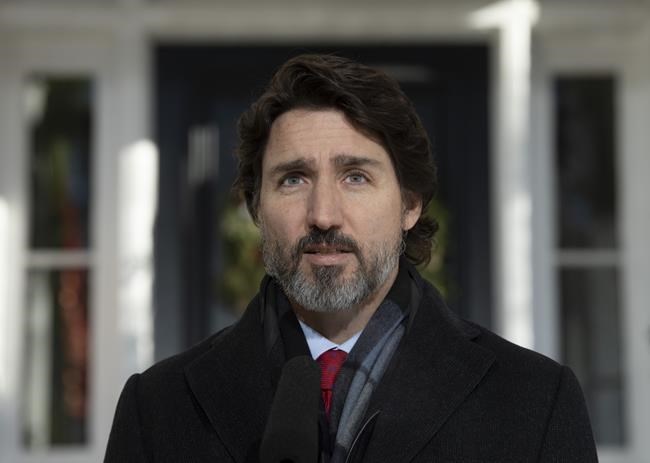Federal officials say they're pushing manufacturers to accelerate shipments of more COVID-19 vaccine doses as calls grow to lock down more parts of the country for the holidays.
Prime Minister Justin Trudeau said Canada is running ahead of schedule in its vaccine rollout, which is set to ramp up next month with scheduled deliveries of 125,000 Pfizer-BioNTech doses per week, for a total of 500,000 doses in January.
Trudeau told reporters that 200,000 doses of the Pfizer-BioNTech vaccine will arrive next week. And pending Health Canada approval, he said 168,000 doses of Moderna's vaccine candidate will be shipped by the end of the year.
The federal government is also investing about $9 million through the National Research Council of Canada to support the development of treatments for COVID-19 and other viral infections, Trudeau said. The funding will go to four Canadian companies working on therapies, including two in Montreal and two in Vancouver.
But even as Canada's immunization campaign steams ahead, Trudeau warned that vaccines won't reach the broader population fast enough for a Christmas miracle, urging Canadians to limit the size of their holiday celebrations.
"As much as many of us want to see our loved ones this Christmas ... we also want to be able to see them and give them big hugs next Christmas."
Procurement Minister Anita Anand said Friday that Canada is on track to receive 255,000 doses from Pfizer-BioNTech in December, up from an expected 249,000 doses.
"In the last two weeks, Canada has aggressively pursued, negotiated, received and administered early doses of the very first COVID-19 vaccine in this country," Anand told a news conference.
"We are in constant contact with our suppliers, and these increased numbers reflect our negotiations."
Massachusetts-based biotech firm Moderna also revealed that its COVID-19 vaccine candidate, which is expected to soon be authorized in Canada and the U.S., can now be shipped without it needing to be frozen.
The development looks to ease the logistics of getting the vaccine to remote locations, a Moderna spokeswoman said.
Previously, it was believed the vaccine had to remain frozen to at least -20 C until shortly before use, but the company said it can now safely transport liquid doses as refrigerated at between 2 C and 8 C.
But Anand noted that the new requirements don't apply to vaccine storage, saying the government is still working to procure freezers to store them once they arrive at their destination, when Health Canada gives the regulatory all-clear.
Dr. Theresa Tam, Canada's chief public health officer, also said Friday that health-care workers should check Pfizer-BioNTech vaccine vials for extra doses before throwing them out.
Tam said the manufacturer has confirmed that some vials contain more than the five doses of 0.3 ml indicated on the label.
She said this excess provides a "buffer zone" to account for potential losses that can occur during storage, preparation and injection of the vaccine.
"I haven't got on-the-ground information as to whether someone is able to get six versus five doses," she said. "But the bottom line is don't throw it away after five doses ... check to see if there's another dose."
Tam said Canada's COVID-19 caseload continues to rise, with an average of more than 6,650 infections reported daily over the past seven days.
The number of people experiencing severe illness is also on the rise, she said, with an average of 4,000 patients being treated in hospital over the past week, including 650 in critical care and 115 deaths reported each day.
Tam said the rapid spread of the virus continues apace in many parts of the country, and she worries the holiday season will only accelerate that trajectory.
"I believe that in many areas of the country, stricter measures should be put in place as soon as possible," she said.
Ontario is set to reveal new measures Monday as the province extended its lockdowns in two COVID-19 hot spots.
Premier Doug Ford said Friday that restrictions set to expire next week in Toronto and Peel Region will remain in place, and his government will contemplate new measures during emergency talks on COVID-19 this weekend.
Ontario reported 2,290 new cases of COVID-19 on Friday and 40 new deaths due to the virus.
Alberta, the province with the highest daily infection rate, announced 1,413 new cases and 25 additional deaths.
The province's chief medical health officer, Dr. Deena Hinshaw, however, had some positive news. She said there were 19,607 active cases, the lowest the figure has been in two weeks.
Manitoba, with the second-highest daily case rate, reported 350 new infections and 10 more deaths.
Quebec had 1,773 new cases and 36 new deaths.
— with files from Mia Rabson
This report by The Canadian Press was first published Dec. 18, 2020.
Adina Bresge, The Canadian Press
Note to readers: This is a corrected story. A previous version erroneously reported the federal government is spending about $9 billion toward research into treatments for COVID-19. In fact, they're spending about $9 million.



